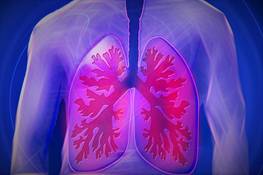Archives
Novel COPD Tx Deemed Safe in Early Study
 An experimental bronchoscopic therapy for chronic obstructive pulmonary disease (COPD) involving the use of electrical waves to disrupt airway passage nerve transmission has been found to be safe and feasibly effective in a small, but early, study. In 15 patients with moderate-to-severe COPD, targeted lung denervation (TLD) was associated with no serious adverse events when given as a single dose through three years of follow-up, according to Arschang Valipour, MD, PhD, of Ludwig Boltzmann Institute for COPD and Respiratory Epidemiology in Vienna, and colleagues.
An experimental bronchoscopic therapy for chronic obstructive pulmonary disease (COPD) involving the use of electrical waves to disrupt airway passage nerve transmission has been found to be safe and feasibly effective in a small, but early, study. In 15 patients with moderate-to-severe COPD, targeted lung denervation (TLD) was associated with no serious adverse events when given as a single dose through three years of follow-up, according to Arschang Valipour, MD, PhD, of Ludwig Boltzmann Institute for COPD and Respiratory Epidemiology in Vienna, and colleagues.
The results confirm those of an earlier pilot study involving 22 patients with COPD treated with TLD in both lungs.
"With long-term safety of targeted lung denervation established between two studies now, focus will be on optimizing the energy dose, further refining the procedure, studying potentially additive effects of targeted lung denervation on top of long-acting muscarinic antagonist treatment, and conducting careful patient phenotyping analysis to identify those patients most likely to benefit from this novel therapy," the authors wrote in the International Journal of Chronic Obstructive Pulmonary Disease.
The TLD was performed with “the intention of achieving bronchodilation through ablation of parasympathetic pulmonary nerves entering the lung and running along the outside of the two main bronchi,” the researchers wrote.
Previous studies involved treatment of the lungs individually, but this study examined the treatment given as a single procedure. All patients met the safety endpoint of “freedom from worsening of COPD” and no procedural complications were reported. Ultimately, the results of lung function and exercise capacity demonstrated similar beneficial effects of TLD without bronchodilators when compared with long-acting anticholinergic therapy at 30 days, 180 days, 365 days, two years and three years post-TLD.
James F. Donohue, MD, of the University of North Carolina Chapel Hill, who wasn’t involved with the study, said the research is exciting, but it's a long way from a small plausible trial, as is the case here, to formal FDA approval.
"The net effect is the targeted tissue ablation at depth with minimal heating and damage of the inner surface of the airway. The goal of targeted ablation is to disrupt motor axons within bronchial nerve branches running along the main bronchi, thereby blocking parasympathetic signaling to the lung and decreasing neuronal release of acetylcholine," the researchers wrote.




